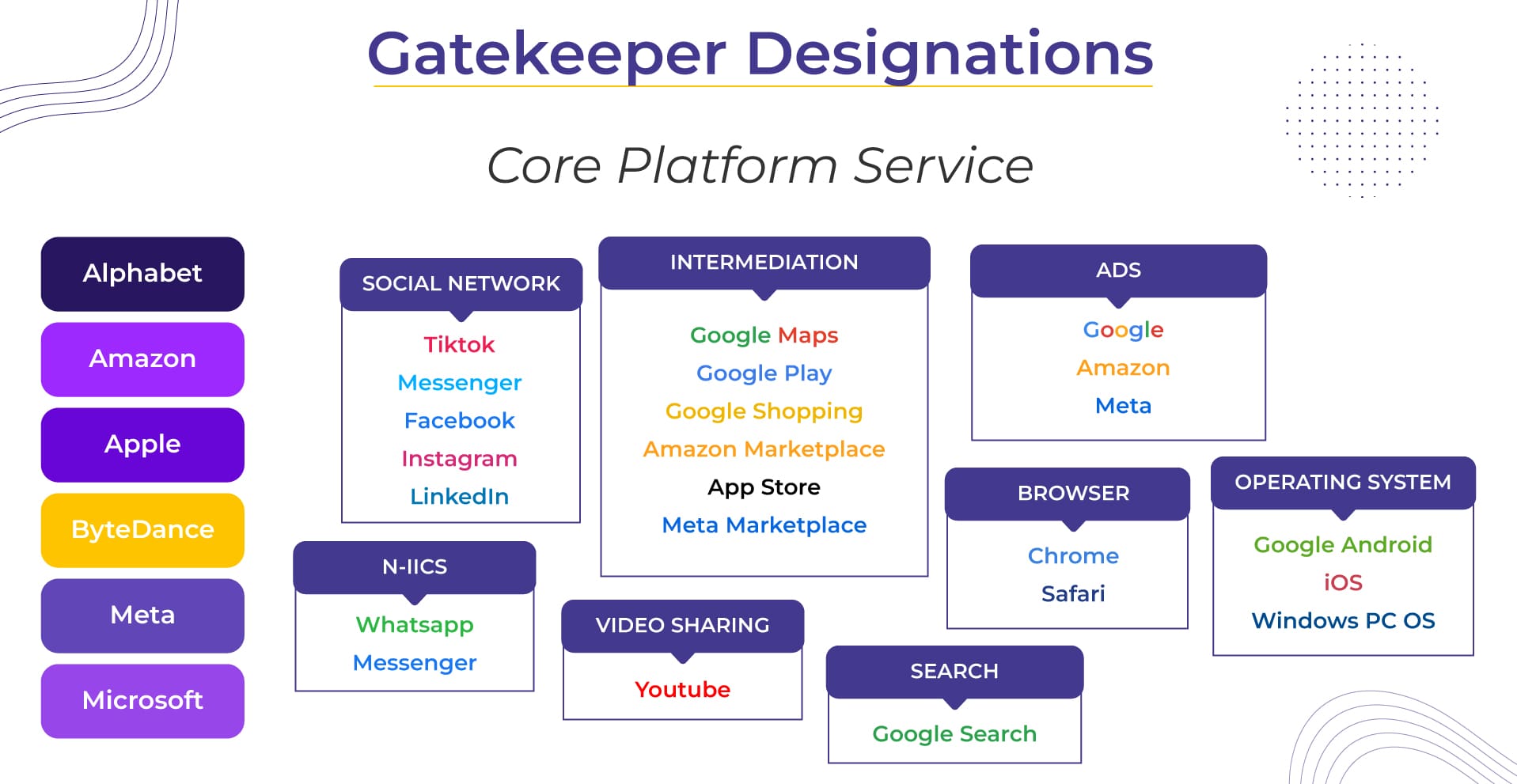The Digital Markets Act (DMA) may sound like a mouthful of acronyms and legal lingo, but let me break it down for you without the cryptic jargon and confusing analogies.
Table of Contents
Think of it as the new rulebook for the digital age, shaping the way major tech players operate. It essentially ensures a fair and competitive digital landscape.
The Digital Markets Act represents a significant step in the EU’s efforts to reshape digital markets, ensuring that tech giants abide by regulations, prioritize consumer welfare, and create a fair playing field for smaller competitors.
Let’s dive into it and learn more!
What is the Digital Markets Act?
The Digital Markets Act (DMA), a proposed regulation by the European Union has been stirring up some buzz since it was first introduced in 2020. It is set to regulate ‘gatekeepers’ in digital markets, but who are these gatekeepers?
Think of big tech giants like Google or Meta that provide core platform services and have significant influence over how we use the internet. They offer indispensable services such as search engines and social networking services, which most businesses rely on for visibility and customer engagement.
‘Gatekeepers’ have an unprecedented power. These platforms control what gets seen or buried under tons of other content. To ensure fairness in this highly competitive environment, the EU decided something had to be done – enter DMA.

The DMA establishes objective criteria for identifying gatekeepers in digital markets. For instance, platforms that have more than 45 million monthly active users and annual EEA turnover exceeding €7.5 billion qualify as gatekeepers under this act.
DMA’s Role In Shaping The EU Digital Economy
The objective of this new legislation isn’t just about putting checks and balances on these giants. It’s also aimed at providing fair competition among businesses aiming for users’ attention across various online intermediation services.
Moreover, data collected from users shouldn’t become leverage against competitors using these platforms – hence stricter rules around targeted advertising.
Navigating The Regulatory Maze With DMA
Navigating through all these new rules might seem tough, especially if you’re operating within EU digital markets. But by understanding the key provisions of DMA, businesses can align their strategies with the changing landscape.
Being labeled as a ‘gatekeeper’, a platform must adhere to certain obligations outlined by DMA, such as permitting third-party software. This is a fundamental aspect of promoting a more open and competitive digital environment. By permitting third-party software, gatekeeper platforms enable other developers and businesses to create complementary applications, services, or tools that can seamlessly integrate with their platform.
This approach encourages innovation, provides users with more choices, and ensures that the gatekeeper platform doesn’t unfairly monopolize the market. By opening their doors to third-party software, gatekeepers can contribute to a more dynamic and diverse digital marketplace, ultimately benefiting both consumers and the broader tech industry.
The Role of Gatekeepers in the Digital Market
Gatekeepers play a critical role in shaping the competitive landscape and regulating access to various online services and platforms.
Here are some key aspects of the role of gatekeepers:
- They have an entrenched and durable position in their market.
- They serve as an important gateway for business users to reach end-users.
- A lack of competition could lead to negative effects on internal markets.
Gatekeepers control access to critical resources or services within our connected world – from your favorite social networking sites right down to your trusty internet browser.
Serving Up Core Platform Services
What exactly is a ‘core’ platform service?
It refers specifically to any service offered by gatekeepers, which includes search engines, social networking services, video-sharing platform services, or even services like maps (think Google). These are essential applications that make our online experience so easy to use.
It’s through these platforms, built by tech titans like Apple and Google, that most apps start their journey to stardom – reaching a massive audience around the globe.

Building an audience can generate consistent revenue, allowing companies to reinvest in their platforms and establish a self-sustaining cycle. This dynamic may also lead to the exclusion of smaller competitors from the market, underscoring the importance of legislation like the DMA.
What are the Key Provisions of the Digital Markets Act?
The DMA incorporates various provisions such as:
- The DMA calls on gatekeeper platforms to avoid engaging in unfair or anti-competitive practices.
- It mandates that gatekeepers provide access to data they’ve collected or generated on their platforms.
- Gatekeepers are required to make sure their platforms can work seamlessly with third-party services.
- The DMA also prevents gatekeepers from playing favorites with their own features or services or those of specific partners.
Non-compliance with these provisions will lead to heavy fines, outlined later in this section.
Implications for App Marketers Under DMA
Outlined below are a few points that may impact you:
- User Privacy and Consent: Get ready to prioritize user privacy more than ever. The DMA demands explicit consent for tracking, especially for advertising. This means your marketing strategies need to be in line with strict privacy rules. You’ll need to figure out how to get users’ consent in a clear and ethical way, possibly adjusting your ad campaigns accordingly. The shift away from using user device IDs is a major concern, and it’s a good idea to start thinking about incorporating SKAdNetwork (SKAN) and Google’s Privacy Sandbox as potential alternatives.

- New App Store Opportunities: Brace yourself for a wave of alternative app stores. Thanks to the DMA, Apple and Google have to open up to third-party app stores. What does this mean for you? New opportunities to reach users through these different stores. It could diversify your app distribution channels, giving you more ways to reach your audience
- Default App Competition: Users won’t automatically use default apps anymore. This puts the ball in your court. You’ll need to work on making your app more appealing so that users choose it over the default options.
- Fair Rankings for All: The DMA puts an end to tech giants favoring their own products over yours. Your app can now compete on a more level playing field. Your app’s quality, user satisfaction, and relevance can determine your rankings, giving you a fair shot against the Googles of the world.
- Compliance Challenges Ahead: The DMA requires you to adapt your marketing practices to meet privacy and transparency rules. It’s a challenge, but ensuring compliance is key. You may need to reevaluate your campaigns and keep up to date on new regulations carefully.
The DMA brings changes to how you do app marketing. Privacy, competition, and transparency are in the spotlight. Those who adapt and seize the opportunities could thrive in this new world.
Potential Pitfalls of the Digital Markets Act
No law is perfect and that includes the Digital Markets Act. Despite its noble intentions to level the digital playing field in Europe, it isn’t without potential pitfalls.
But what are these challenges exactly?
Overly Broad Definitions May Lead to Uncertainty
The DMA introduces concepts such as ‘gatekeeper’ and ‘core platform services’. These terms have been defined using objective criteria which aim for clarity. However, they might be overly broad or ambiguous.
This can create uncertainty about who falls under their scope. For example, does a company like Spotify qualify as a gatekeeper? Or how about an online marketplace like Etsy? This lack of precision may hinder business operations and deter innovation within European markets.
Broad definitions within the Act can likewise offer big tech companies’ legal departments further opportunities to circumvent specific provisions.
Lack of Flexibility Can Stifle Innovation
Innovation thrives on flexibility – something the DMA could potentially restrict with its strict rules for designated gatekeepers. Companies constantly need to evolve their respective core platform services in order to stay competitive.
A rigid framework could prevent tech giants from adapting swiftly or introducing new features beneficial for users due to fear of systemic non-compliance penalties. The resulting caution might inadvertently dampen innovation in digital platforms across EU markets.
The Imposition of Fines Might Not Deter Big Tech Giants
The DMA has provisions allowing the European Commission to impose fines up to 10% of worldwide turnover on companies failing obligations or showing repeated non-compliance behaviors – sounds hefty right?
Despite the potential severity of fines, for large tech firms like Google or Amazon, they could be viewed as just another expense associated with their operations. They may prefer to pay the fine rather than alter their established business practices that are integral to their market dominance.
One Size Doesn’t Fit All
The DMA’s aim for uniform rules across all EU member states is clear. But, this one-size-fits-all approach might overlook the unique aspects and subtleties of each country’s digital market. There’s a risk that it could unintentionally slow down their growth.
While the DMA presents an essential step towards addressing competition concerns and ensuring fair access to digital markets, it’s essential to acknowledge that a one-size-fits-all solution for every gatekeeper may not always be the most effective approach.
The digital ecosystem is incredibly diverse, with varying business models, market dynamics, and consumer behaviors. Imposing identical regulations on all gatekeepers, irrespective of their size or market niche, could inadvertently stifle innovation and hinder the ability of smaller companies to compete effectively.
To strike a balance between fostering competition and supporting innovation, the DMA must allow for flexibility and tailored regulations that consider the specific circumstances of different gatekeepers. This approach can help ensure that the DMA achieves its intended goals without inadvertently discouraging innovation or harming the very consumers it aims to protect.
An Opportunity for New App Stores?
As Apple and Google prepare to allow third-party app stores on their devices in the European Union under the DMA, rivals are positioning themselves as alternatives to the dominant App Store.
![]()
The DMA, which fully takes effect in March 2024, provides an easier route for third-party app stores to access iPhones and Android devices. Industry experts predict the emergence of numerous app stores, as companies aim to circumvent what they see as “Apple’s tax”.
Frustrated developers may be lured to these alternative stores with lower commission fees and the possibility of exclusive app deals. However, challenges lie in convincing consumers to embrace these alternatives.
A Balancing Act for Large Online Platforms
Industry insiders believe that DMA strikes a balance between ensuring fair competition and allowing innovation in digital markets. But as Commission Designated Gatekeepers, large online platforms must meet defined objective criteria to keep things fair for all players involved.
What does this exactly mean? Check out the chart below

An Ounce of Prevention…
In addition to establishing new laws, one significant aspect of the DMA involves preventive measures against systemic non-compliance by designated core platform service providers like search engines or social networking sites.
This means making sure no player becomes too powerful that it threatens other businesses or harms consumers’ rights in any way – hence why potential fines could amount to up to 10% of worldwide turnover.
Moving forward with such comprehensive legislation will undoubtedly lead us towards more balanced digital economies across Europe – something which every industry expert would agree upon.
Impact on Tech Giants
The DMA represents a dramatic shift in the digital economy, particularly for tech giants, with its criteria-based obligations. As designated gatekeepers of large online platforms, these companies must navigate new regulations to ensure fair competition.
A key facet of DMA is that it imposes obligations based on defined objective criteria. Essentially, if you’re big and influential enough in the EU’s digital markets (like an app store or search engine giant) you’re likely considered a gatekeeper.
Tech Companies Redefining Practices
This designation requires tech companies to modify their practices significantly. For instance, according to DMA provisions, they need more transparency around targeted advertising and the use of data collected from users across their respective core platform services.
Let’s break it down with a different example: Think of Google Maps, your trusty GPS for daily navigation. However, when viewed through the Digital Markets Act, it’s not just an app anymore; it’s a powerful service that regulates how businesses and consumers connect in its world. That’s why the commission labels it as a core platform service.
Staying Ahead with Compliance Reports
Fulfilling these DMA obligations isn’t simply about adhering to rules but also proving compliance through detailed reports regularly submitted for review.
Social Networking Services under Scrutiny
DMA doesn’t let social networking services off easy either, the likes of Meta face similar stringent rules. To ensure they’re providing fair opportunities for everyone, these social networking giants need to offer access to their APIs, allowing businesses and competitors alike a chance at the playing field.
And what happens if these gatekeeper platforms fail to comply? Hefty fines are calculated based on worldwide turnover.
Worldwide Turnover & Imposing Fines
Worldwide turnover refers to a company’s total revenue from all its operations, not just those within European Union borders. This figure serves as a benchmark for calculating potential penalties.
A business that violates DMA regulations may face financial consequences relative to their global income – not merely their earnings in Europe. So even if your company has minimal presence or activity in the EU digital markets but boasts substantial revenues elsewhere, non-compliance can still hit you hard financially.
Determining Penalties Under The DMA
Fines levied under the DMA are designed to encourage compliance and deter misconduct among tech giants and large online platforms operating within a European jurisdiction. As such, these fines aren’t flat rates, they scale with an entity’s size and scope measured by its worldwide turnover.
To illustrate: let’s say your app store grosses €75 million annually across all territories but breaches defined obligations outlined by the Commission Designated Gatekeepers of core platform services rules, a systemic non-compliance situation could be at hand.
Penalty Proportions According To DMA First Offense: Up to 10% of global annual turnover. Repeated Non-Compliance: Potentially up to 20% of worldwide income.

Personal Data & Intermediation Services
For those navigating the EU’s digital markets, it’s crucial to understand how these concepts intertwine.
We live in an era where data is often dubbed as the new gold. Personal data forms the backbone of targeted advertising, enabling businesses to tailor their offerings to consumer needs effectively.
However, this approach raises some pressing concerns about privacy and security.
Data Protection Under DMA
In response, DMA puts forth stringent regulations concerning personal data handling by gatekeeper platforms. Users are given more power over their data due to the transparency that DMA promotes.
DMA mandates that designated core platform services should not combine personal data sourced from different business units without explicit user consent – a clear move towards ensuring fair practices in managing user info across diverse applications like social networking services or search engines.
Intermediation Services: The Bridge Between Businesses and Consumers
Moving onto online intermediation services, they essentially act as bridges connecting business users with consumers on large online platforms such as app stores or search engines. They play a pivotal role in shaping digital economies worldwide by defining objective criteria for businesses’ presence on respective core platform services like Google Maps or Samsung Internet Browser.
- Data Collected: One critical aspect of intermediary operations revolves around collecting vast amounts of consumer behavior details through cookies tracking every click you make while surfing web pages.
- Governing Principles: With so much at stake regarding privacy issues, the European Commission designates certain rules under DMA obligations related specifically towards management within these areas including requiring service providers to obtain explicit permission before storing any personally identifiable information on their servers among other things.
Role of Intermediation Services in DMA
In the grand scheme of DMA, online intermediation services hold a significant role. They are responsible for managing business users’ access to consumers through core platform services. Therefore, they must comply with DMA regulations designed to promote fair competition and transparency in digital markets.
Wrapping up, it’s crucial to grasp how personal data interacts with online intermediation services. This understanding can truly make a difference in our digital lives.
Conclusion
The Digital Markets Act is an important piece of legislation that is encouraged to promote a fair playing field in the EU starting next year.
The obligations and prohibitions set by DMA for these gatekeepers will impact how business is done on these platforms. For app marketers, this means adapting strategies to align with new regulations.
Tech giants won’t be left unscathed either. The rules may shake up their operations but remember change isn’t always bad!
Data privacy remains at the heart of everything, even amidst changes in intermediation services under DMA’s watchful eyes. With stricter rules and more transparency, users can benefit from enhanced data protection and control, which is a significant win for all in the digital landscape.




